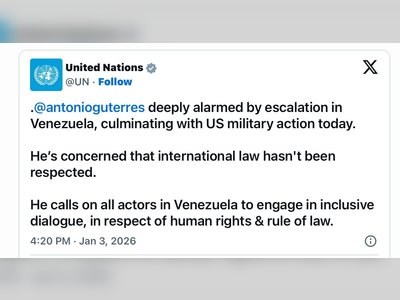
Germany Suspends UN Refugee Resettlement Program Amid Political Negotiations
The temporary halt affects new applications while ongoing coalition talks influence future refugee admissions.
Germany has announced a temporary halt to its participation in a United Nations refugee resettlement program, as confirmed by the Federal Office for Migration and Refugees (BAMF).
This decision suspends the acceptance of new applications during ongoing coalition negotiations involving the conservative Christian Democrats (CDU) and the center-left Social Democrats (SPD).
BAMF representatives indicated that the processing of refugee cases that are already in advanced stages will continue, but no new applications will be accepted.
The UN Refugee Agency (UNHCR) in Germany, represented by spokesperson Chris Melzer, stated an expectation that the program will resume following the appointment of a new interior minister.
Germany has been actively participating in this resettlement program since 2012, which focuses on vulnerable refugees in need of protection, including children, victims of torture, and individuals requiring urgent medical assistance who can no longer remain in their first country of arrival.
Historically, Germany has received approximately 5,000 refugees annually through this initiative, positioning itself as the third-largest host nation after the United States and Canada.
A notable portion of these resettled refugees has come from Syria, with additional numbers from Iraq, Yemen, Sudan, South Sudan, the Democratic Republic of Congo, Somalia, and Eritrea.
Germany has committed to admitting a total of 6,550 refugees in 2024 and 2025 as part of a commitment to the European Commission, a promise supported by EU funding.
The recent suspension occurs amidst discussions regarding immigration policy, which have become a focal point for Friedrich Merz, a prominent figure in the CDU and a potential future Chancellor.
Merz has emphasized the importance of immigration as electoral concerns mount, despite evidence showing no direct correlation between immigration and crime rates.
Previous efforts by Merz to enforce stricter immigration regulations, such as advocating for the establishment of permanent border controls, faced considerable opposition and were perceived as appealing to far-right voters.
As coalition negotiations progress, there are indications of a potential shift away from conventional refugee resettlement programs, exploring new initiatives tailored to Germany's labor market needs.
Proposed changes may include the termination of similar schemes, including one designed to resettle individuals escaping Taliban rule in Afghanistan.
The UNHCR has also expressed concern regarding policies in other countries, notably the United States, where the previous administration under President Trump had withdrawn from participating in the resettlement program, despite a court ruling mandating the resumption of applications.
This decision suspends the acceptance of new applications during ongoing coalition negotiations involving the conservative Christian Democrats (CDU) and the center-left Social Democrats (SPD).
BAMF representatives indicated that the processing of refugee cases that are already in advanced stages will continue, but no new applications will be accepted.
The UN Refugee Agency (UNHCR) in Germany, represented by spokesperson Chris Melzer, stated an expectation that the program will resume following the appointment of a new interior minister.
Germany has been actively participating in this resettlement program since 2012, which focuses on vulnerable refugees in need of protection, including children, victims of torture, and individuals requiring urgent medical assistance who can no longer remain in their first country of arrival.
Historically, Germany has received approximately 5,000 refugees annually through this initiative, positioning itself as the third-largest host nation after the United States and Canada.
A notable portion of these resettled refugees has come from Syria, with additional numbers from Iraq, Yemen, Sudan, South Sudan, the Democratic Republic of Congo, Somalia, and Eritrea.
Germany has committed to admitting a total of 6,550 refugees in 2024 and 2025 as part of a commitment to the European Commission, a promise supported by EU funding.
The recent suspension occurs amidst discussions regarding immigration policy, which have become a focal point for Friedrich Merz, a prominent figure in the CDU and a potential future Chancellor.
Merz has emphasized the importance of immigration as electoral concerns mount, despite evidence showing no direct correlation between immigration and crime rates.
Previous efforts by Merz to enforce stricter immigration regulations, such as advocating for the establishment of permanent border controls, faced considerable opposition and were perceived as appealing to far-right voters.
As coalition negotiations progress, there are indications of a potential shift away from conventional refugee resettlement programs, exploring new initiatives tailored to Germany's labor market needs.
Proposed changes may include the termination of similar schemes, including one designed to resettle individuals escaping Taliban rule in Afghanistan.
The UNHCR has also expressed concern regarding policies in other countries, notably the United States, where the previous administration under President Trump had withdrawn from participating in the resettlement program, despite a court ruling mandating the resumption of applications.
AI Disclaimer: An advanced artificial intelligence (AI) system generated the content of this page on its own. This innovative technology conducts extensive research from a variety of reliable sources, performs rigorous fact-checking and verification, cleans up and balances biased or manipulated content, and presents a minimal factual summary that is just enough yet essential for you to function as an informed and educated citizen. Please keep in mind, however, that this system is an evolving technology, and as a result, the article may contain accidental inaccuracies or errors. We urge you to help us improve our site by reporting any inaccuracies you find using the "Contact Us" link at the bottom of this page. Your helpful feedback helps us improve our system and deliver more precise content. When you find an article of interest here, please look for the full and extensive coverage of this topic in traditional news sources, as they are written by professional journalists that we try to support, not replace. We appreciate your understanding and assistance.











